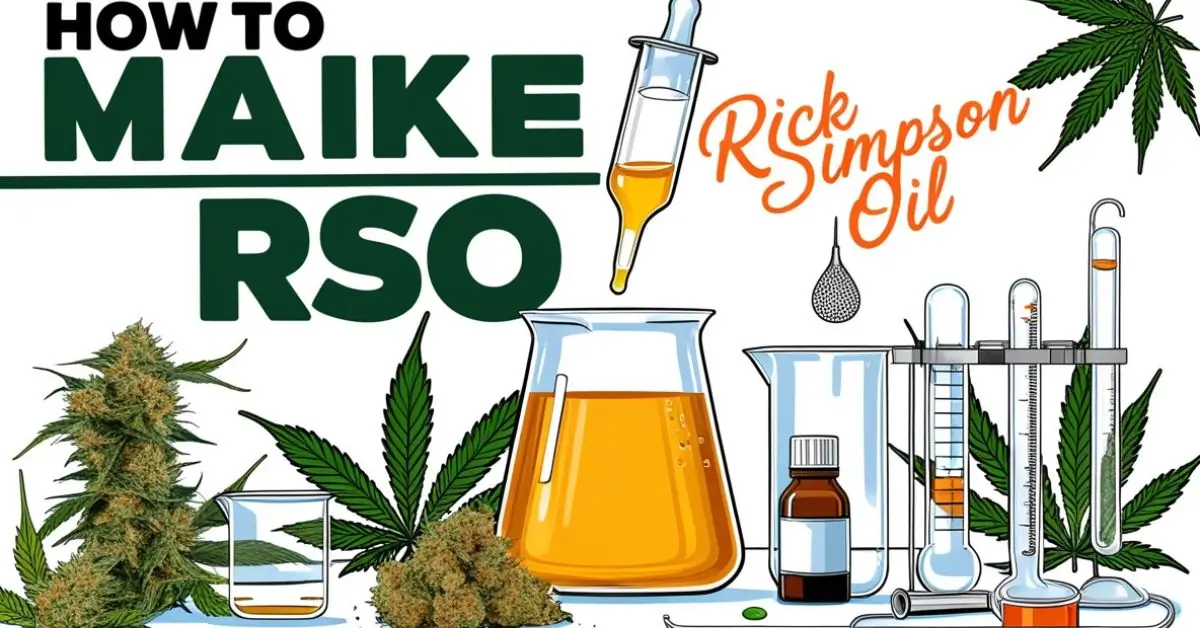Rick Simpson Oil (RSO) has gained significant attention in recent years due to its potent medicinal properties, particularly in the realm of cancer treatment and pain relief. Named after its creator, Rick Simpson, RSO is a concentrated form of cannabis oil that is rich in cannabinoids, primarily THC (tetrahydrocannabinol), the compound responsible for the psychoactive effects of cannabis. Unlike other cannabis products, RSO is often made to be consumed in its entirety rather than vaporized or smoked.
This article delves into the history of RSO, its uses, how it differs from other cannabis concentrates, and most importantly, how to make RSO safely at home. We will also touch on the ethical and legal considerations surrounding its production and use.
What is RSO?
RSO is a full-spectrum cannabis extract that contains high levels of THC along with other beneficial cannabinoids such as CBD (cannabidiol), CBN (cannabinol), and various terpenes. This full-spectrum nature means that it utilizes the “entourage effect,” where cannabinoids and terpenes work together synergistically to provide a more potent therapeutic effect.
Rick Simpson initially created RSO to treat his skin cancer. He shared his recipe and experiences with the world, which sparked widespread interest in using high-THC cannabis oil for various medicinal purposes. The oil is particularly valued for its potential in treating chronic pain, inflammation, anxiety, depression, and even cancer. However, research into these benefits is ongoing, and it’s important to note that the efficacy of RSO can vary from person to person.
The History of Rick Simpson and RSO
Rick Simpson, a Canadian medical marijuana activist, made his first batch of cannabis oil after being diagnosed with basal cell carcinoma, a type of skin cancer. After applying the oil topically to his cancerous spots, Simpson claimed that his skin cleared up. Since this experience, Simpson has advocated for the medical use of cannabis, sharing his method for producing cannabis oil with others.
Though cannabis has been used medicinally for centuries, RSO stands out because of its high THC concentration and its intended medical applications. Simpson has been vocal about the fact that he does not sell RSO but encourages people to make it themselves at home. His story has inspired countless people to explore cannabis oil as a potential treatment for various health conditions.
How is RSO Different from Other Cannabis Oils?
One of the main distinctions between RSO and other cannabis oils is the high concentration of THC in RSO. While CBD oils primarily contain cannabidiol, which is non-psychoactive, RSO’s high THC content provides both therapeutic effects and a strong psychoactive high.
Moreover, many cannabis extracts are made using solvents like butane or CO2. RSO, on the other hand, traditionally uses ethanol or isopropyl alcohol as a solvent. The resulting product is a dark, thick oil that can be ingested orally, applied topically, or vaporized.
The full-spectrum nature of RSO also sets it apart from other cannabis oils. Many CBD oils and other concentrates undergo processes that isolate specific cannabinoids, losing the benefits of the plant’s other components. RSO keeps as much of the plant intact as possible, allowing for a more comprehensive therapeutic effect.
Legal Considerations
The legal status of RSO varies by country and even by state in places like the U.S., where cannabis laws are regulated at the state level. In many places, THC-rich products like RSO remain illegal or are only available for medical purposes with a prescription. Even in areas where cannabis is legal, producing RSO can sometimes be a legal gray area due to the use of solvents like ethanol, which can be hazardous when not handled correctly.
It is essential for anyone interested in making RSO to research the laws in their area and ensure they are not violating any regulations. For those living in places where making RSO is illegal, there are often legal alternatives, such as purchasing pre-made cannabis oils from licensed dispensaries.
Medicinal Uses of RSO
RSO has been touted for a variety of medicinal uses. While scientific research is still catching up to anecdotal evidence, there is promising potential for RSO in treating the following conditions:
- Cancer: Rick Simpson’s original use of the oil was to treat his skin cancer. Many people continue to explore RSO as an alternative cancer treatment, though it is important to note that there is not yet enough scientific evidence to conclusively state that cannabis oil can cure cancer.
- Chronic Pain: One of the most common uses of RSO is for chronic pain relief. The high THC content can help alleviate pain by interacting with the body’s endocannabinoid system.
- Neurological Conditions: Some studies suggest that cannabinoids can help reduce seizures and improve symptoms in patients with conditions like epilepsy and multiple sclerosis.
- Mental Health Issues: RSO’s effects on anxiety, depression, and PTSD are still being studied, but many users report that cannabis oil helps manage these conditions.
- Inflammation: Cannabinoids are known for their anti-inflammatory properties, which makes RSO a potential treatment for inflammatory conditions like arthritis.
Step-by-Step Guide to Making RSO
Ingredients and Equipment:
- 1 pound of dried cannabis (preferably an Indica strain for medicinal use)
- 99% isopropyl alcohol or ethanol (enough to fully cover the cannabis in the extraction process)
- Large mixing bowl
- Wooden spoon or similar stirring tool
- Cheesecloth or fine mesh strainer
- Rice cooker (to safely evaporate the solvent)
- Stainless steel measuring cup
- Fan (for ventilation)
- Syringes for storing the final product
Safety Considerations:
Before you start, it is essential to note that making RSO involves using flammable solvents. You must take proper precautions, including working in a well-ventilated area, away from any open flames or sparks. It’s recommended to do this process outside or in a room with good airflow.
The Process:
- Prepare the Cannabis:
- Start by grinding or breaking up your cannabis into small pieces to ensure that the solvent can easily extract the cannabinoids. Place the cannabis into a large mixing bowl.
- Add the Solvent:
- Pour the isopropyl alcohol or ethanol into the bowl, making sure that it covers the cannabis entirely. Use a wooden spoon or similar tool to stir and crush the cannabis, allowing the solvent to strip the cannabinoids from the plant material.
- Strain the Mixture:
- After stirring for about three minutes, strain the mixture through a cheesecloth or fine mesh strainer into another container. The liquid should be dark green and contain all the cannabinoids from the cannabis plant.
- Repeat Extraction:
- For maximum efficiency, you can repeat the process by adding more solvent to the leftover cannabis and stirring again. Strain this second batch and combine it with the first.
- Evaporate the Solvent:
- Transfer the mixture into a rice cooker to safely evaporate the solvent. Set the rice cooker to a low heat setting, and keep the lid off. The alcohol will evaporate, leaving behind a thick, tar-like oil. Use a fan to blow away any fumes, and ensure you are in a well-ventilated area to avoid inhaling solvent vapors.
- Collect the Oil:
- Once most of the solvent has evaporated, the mixture will begin to thicken. Carefully pour the remaining oil into a stainless steel measuring cup. Set the cup in a warm water bath to help evaporate the last traces of solvent.
- Store the RSO:
- Once the solvent has completely evaporated, use syringes to collect and store the oil. The syringes make it easier to measure out doses when using RSO medicinally.
Dosage and Usage
RSO is extremely potent, and users are advised to start with very small doses. Typically, patients begin with a dose about the size of half a grain of rice and gradually increase their dosage as their body adjusts to the THC content.
RSO can be consumed orally by placing it under the tongue, ingested with food, or applied topically to the skin for localized relief. Because it contains high levels of THC, users should be cautious of the psychoactive effects, especially if they are new to cannabis products.
Conclusion
Rick Simpson Oil is a powerful cannabis concentrate with a wide range of potential medicinal applications. While it may not be for everyone, many people have found relief from chronic pain, inflammation, cancer symptoms, and more using RSO. Making RSO at home is possible but requires caution, patience, and adherence to safety protocols due to the use of flammable solvents.
As with any alternative treatment, it’s important to consult with a healthcare professional before using RSO, particularly for serious conditions like cancer. Although more research is needed, the growing interest in RSO highlights the potential for cannabis to play a significant role in future medical treatments.











